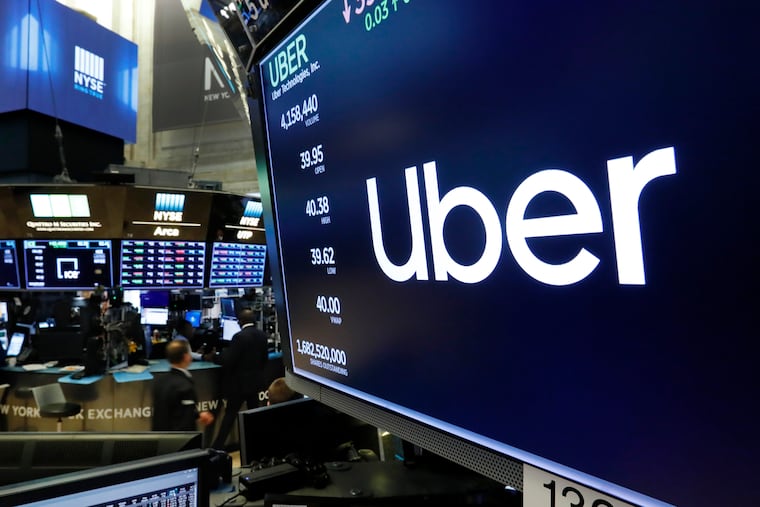Philly woman suing Uber, saying she was sexually assaulted by driver
What responsibility do ride-sharing companies have for the actions of their drivers?

It’s the stuff of nightmares: After a night drinking with friends, a young woman hails an Uber for what she thinks will be a safe ride home. The driver sexually assaults her.
A Philadelphia woman alleges that’s what happened to her in October 2017, according to a civil lawsuit she has filed against the ride-sharing company and the driver.
Uber has disclosed it received nearly 6,000 reports of sexual assault in 2017 and 2018. Meanwhile, the rapid development of Uber, Lyft, and other platform-based companies in the sharing economy continues to challenge long-standing legal approaches and regulatory schemes across the country.
“The gist of the case is Uber promises safety,” said J. Conor Corcoran, a Center City lawyer representing the woman. “The ride did get her from point A to point B, but it wasn’t safe. He wouldn’t have had the opportunity to take advantage of her without Uber’s facilitation.”
Uber’s promise, reinforced in advertising, corporate communications, and social media campaigns at the time, amounted to a warranty on which the woman relied and the company failed to deliver, the lawsuit argues. It also contends that Uber did not do adequate vetting of drivers as it was growing rapidly and people flocked to the platform to work.
An Uber spokesperson said the company won’t comment on pending litigation. Its attorneys have not yet filed an answer to the suit. Uber says it’s always working to improve safety for users of its app but declined to talk about it on the record.
The ride-sharing company formerly required people who alleged sexual assault or harassment to submit their cases to binding arbitration, private court-like hearings to settle disputes, and to adhere to a nondisclosure agreement. But Uber changed that policy in 2018 under pressure from former employees and the public and as it was preparing to make an initial public stock offering.
Now, the company says, survivors are free to pursue claims in open court if they choose. In December 2019, Uber issued the report detailing the 6,000 sexual-assault reports it had handled, saying that it was “statistically, extremely rare” but that even one incident was “unacceptable.” Uber is scheduled to release another report on assaults by the end of the year.
Competitor ride-sharing company Lyft issued its own report in October, disclosing 4,158 reported sexual assaults from 2017 through 2019. It ended its mandatory arbitration requirement right after Uber did.
On Oct. 6, 2017, the Philadelphia woman was with friends at Time restaurant and bar on Sansom Street and, about 2 a.m., used the Uber app on her smartphone to hail a ride to her North Philadelphia apartment about two miles away, the suit says.
The driver came into the restaurant to meet her and escort her to his car, the suit says. He put her in the front seat, and she remembered nothing of the ride, it says. She said she had been drinking but not enough to black out and believes the driver had drugged her drink inside the restaurant.
The complaint says the woman awoke in her apartment the next morning with the driver standing over her.
She had a sexual-assault forensic exam done and was interviewed by Philadelphia detectives, who also took a sheet and towel with semen samples on them, Corcoran said. He added that she never heard back from police.
The Philadelphia Police Department did not respond to questions about the case, including whether there is an active investigation.
The woman, through her lawyer, declined to comment.
Uber has been shielded from legal liability in many cases because it classifies drivers as independent contractors rather than employees, said Adam F. Scales, a professor at Rutgers Law School in Camden who specializes in torts and insurance law.
“They have maintained they’re just a platform that puts people together,” Scales said. “Obviously reality has undermined that some.”
But even in cases where judges rule drivers have the status of employee, Uber has a “very strong” argument that “sexual assault, which is horrific, is not within the scope of duties of a driver” and the company can’t anticipate and be responsible for an individual’s assault, Scales said.
On the other hand, he said, Uber could be assessed damages if it is proved that it did not do enough investigation of drivers before they joined the app or for insufficient monitoring of them.
The suit was initially filed in state court in late September but was transferred to federal District Court on Oct. 5 at Uber’s request because the parties are from different states. The company is headquartered in California, and it and its subsidiaries are incorporated in Delaware.
In late October, Corcoran moved to have the federal judge send the case back to the Court of Common Pleas in Philadelphia because the driver, who is also a defendant, is a resident of the state where the alleged actions took place.
There is no deadline by which the judge must rule. The suit does not specify the monetary damages the woman is seeking.